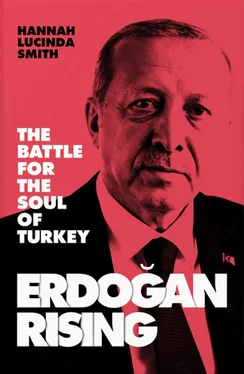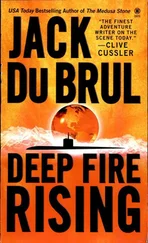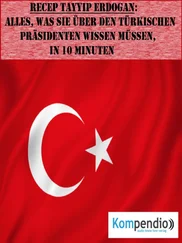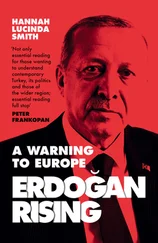At least the street sellers still have events where they can hawk their merchandise.
‘I used to sell at the football matches,’ says Mehmet, a small, gnarled old man with a thick grey moustache and a clear disdain for this evening’s show. ‘You know – fake team shirts, scarves, that kind of thing. Then they started cracking down on us. The Zabıta’ – a unique Turkish cross-breed of trading-standards-officer-meets-traffic-warden – ‘started issuing fines, and now the teams’ lawyers walk around and check out our stalls. If they see you selling anything with logos, they sue you.’
‘When did the crackdown begin?’ I ask.
‘When Erdoğan came to power!’ he laughs as he replies.
Even here, at Erdoğan’s own event, Mehmet is being screwed: official event marshals are riding around in pick-up trucks laden with Turkish flags and baseball caps bearing the official coup commemoration logo, cheap mementoes they are handing out for free. I pick some up to add to my burgeoning collection of Turkish political tat, and continue on towards the bridge.
Just before the arch takes flight the crowds grow so thick I lose the will to keep pushing through. Instead I stop, look around, and take in the febrile buzz. A friend and fellow journalist has texted me, warning that the riled-up crowd has been chanting abuse at the CNN news crew. I thought that, with my notebook firmly in my rucksack, I would blend in. I was wrong.
‘Excuse me, are you a journalist?’ asks a slight young woman in black abaya and headscarf who emerges from nowhere, catching me by my elbow, and off guard.
Yes, I reply, I am.
‘Which channel?’
Her eyes are hard and suspicious, not friendly as those of nosy Turks usually are. I tell her I work for a newspaper, not for TV, but she doesn’t believe me.
‘Really?’
My companion for the evening was caught in a mob attack during the coup in Egypt four years ago, and is alert to the warning signs. Other people are beginning to look around, so I shake the woman off and we push deeper into the crowd. When I stop again, I notice a young man with terrible teeth, dark brown and shunted into his mouth at weird angles, gazing up at the screen and grinning.
‘Tayyip!’ he yells as live pictures of his hero, just a few hundred metres down the road, flash up. ‘TAYYIIIIIIIIIIP!’
He is so enraptured he doesn’t notice me staring.
One week earlier: it’s the other tribe’s turn. On a humid Sunday afternoon scores of Turks in white T-shirts descend onto a corniche on the Asian bank of the Bosphorus. There is no Erdoğan merchandise on sale here.
Kemal Kılıçdaroğlu, the leader of the opposition, has just walked here from Ankara – a 280-mile, three-week trek in the blistering heat, accompanied by hundreds of police officers. Along the way he has gathered thousands of supporters shouting ‘HAK! HUKUK! ADALET!’ (Rights! Law! Justice!) as they weave through Istanbul’s poor outer suburbs. One side of the highway leading into the city has been shut down for the marchers. Vans travelling up the other side beep their horns in solidarity. From the balconies of crumbling concrete apartment blocks, women swathed in black burkas shake their fists and scream in fury. Others hold up their hands in a four-fingered salute with the thumb tucked under – the sign of the Egyptian Muslim Brotherhood, adopted by Erdoğan’s fan club.
Kılıçdaroğlu walks the final mile alone – a small, defiant figure surrounded by rings of black-clad cops. No one thought he would get this far. When he began walking, spurred by the arrest of one of his party members, he was mocked. Now he is about to step on stage in front of hundreds of thousands – perhaps millions – of people who support him, and who despise Erdoğan.
But Kılıçdaroğlu’s face wouldn’t look quite right on a T-shirt. He is grey, diminutive, pushing seventy. A career bureaucrat. A man who has spent his seven years at the head of the Republican People’s Party, or CHP ( Cumhuriyet Halk Partisi ), Turkey’s secularist party, eclipsed by six-foot ex-footballer Erdoğan. So instead of Kılıçdaroğlu’s face the street sellers’ wares bear the face of a blue-eyed blond with sharp cheekbones and a debonair dash: Mustafa Kemal Atatürk, who not only founded Kılıçdaroğlu’s party, but also the Turkish republic. He was a polymath, a womaniser and a thirsty drinker, a war hero, a visionary and a statesman. And he is a hero – to this half of the country. He has been dead for eighty-one years, and he is still Erdoğan’s biggest rival.
Here is the Atatürk legend. He was born simple Mustafa, son of a former army officer and a housewife, in 1881 in Thessaloniki, now in modern Greece but at that time one of the richest and most diverse cities in the Ottoman Empire. He followed the familiar path for a bright boy from a modest background. First, he attended military school, where he studied Western philosophy alongside the bedrocks of literacy and numeracy, and was bestowed with the second name Kemal, meaning perfection, by a maths teacher. After finishing school he became an army officer.
He was serving an empire in decline. The Ottomans had once ruled a great stretch of the globe spanning Europe, Asia and Africa, but by the beginning of the twentieth century the peripheries were breaking away. The army Kemal joined was growing increasingly disloyal to the sultan, and by the onset of the First World War had all but overthrown him. Kemal was a lower-level player in the revolt, and a passionate advocate of reform. His experiences serving on fronts in the Balkans, North Africa and the Levant convinced him that such a huge, unwieldy, multi-ethnic empire could no longer survive and that it must be trimmed back to a Turkish nation state.
The Great War was the Ottoman Empire’s inglorious finale. By then it was being run de facto by the Young Turks, a cadre of military officers including Kemal. Meanwhile the sultan, Mehmet V, sat sulking in his palace in Istanbul, fully aware that almost all his power had drained away, even though by name he was still head of an empire.
Kemal was dismayed when his fellow officers decided to enter the war on the side of the Germans, but he fought with distinction. He secured his reputation as a war hero at the Battle of Gallipoli in 1915, when troops from Britain, France, Australia and New Zealand launched a huge naval attack on the Dardanelles, the last maritime bottleneck before Istanbul. Against all odds, the Turks led by Kemal beat them back in a final show of force – and then the empire crumpled entirely.
The Ottomans’ decision to ally with the Germans proved terminal. On 13 November 1918, just two days after the end of the war, British, French, Greek and Italian forces moved into Istanbul. Soon after, the Greeks seized a large swath of the Aegean coast and Thrace, the funnel of land leading from Istanbul into Europe. Meanwhile, the French had moved into the cities of the south-east, close to the current border with Syria, as well as the coal-rich regions of the north.
A new sultan, Mehmet VI, did little to prevent the unpicking of his empire. In 1920 he signed the Treaty of Sèvres, which recognised the various foreign mandates in his own lands. The fight appeared to have gone out of the Ottomans – but it had not gone out of Mustafa Kemal. Almost as soon as the armistice was signed he began hatching plans to reverse the damage. Slipping Istanbul, he headed for Samsun, a city on the Black Sea coast in northern Turkey, and began building a national resistance movement. Despite opposition from the sultan, who ordered him to cease his activities, by early 1920 Mustafa Kemal had built a massive following and established an alternative parliament in Ankara, a small city on the Anatolian plain. From there, he launched the Turkish war of independence, seizing back the Anatolian territories, the coast and then, finally, Istanbul. The last British warship departed the old imperial capital on 17 November 1922. Aboard was Mehmet, the last sultan, expelled in disgrace by the new parliament set up by Mustafa Kemal. Mehmet returned six years later, in a coffin, having lived out his remaining years on the Italian Riviera.
Читать дальше












